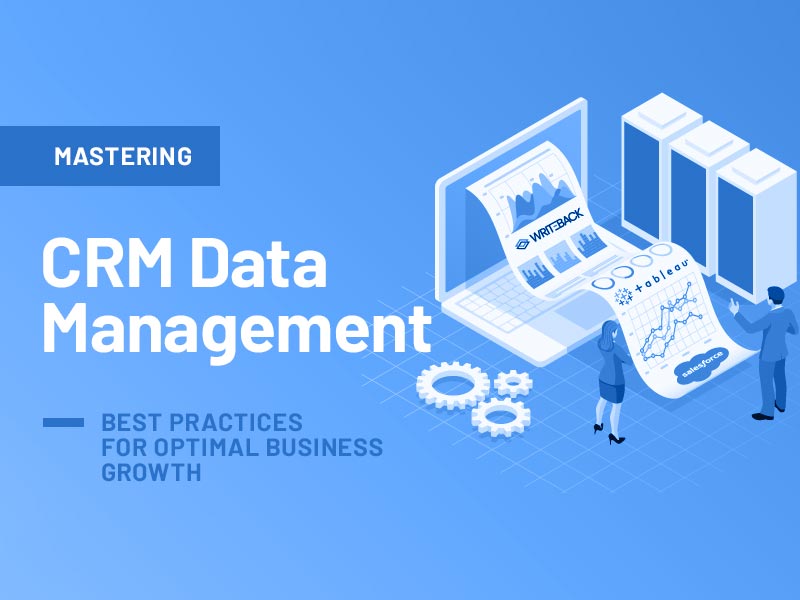In today’s fast-paced business landscape, Customer Relationship Management (CRM) has become an invaluable tool for companies seeking sustainable growth. Properly managing CRM data can make or break a business. In this article, we’ll delve into the world of CRM data management and explore the best practices that can propel your business to new heights.
Introduction
In the digital age, businesses are swimming in a sea of data. CRM systems are the lighthouses guiding them through the waves. Mastering CRM data management is the compass that ensures businesses navigate these waters effectively.
Why CRM Data Management is Crucial
Effective CRM data management goes beyond organizing contact information; it’s about understanding your customers, their needs, and their behaviors. It enables you to make data-driven decisions, create personalized experiences, and ultimately, drive business growth.
Defining CRM Data Management
CRM data management involves collecting, organizing, and maintaining customer data within a CRM system. It’s about turning raw data into actionable insights that drive marketing, sales, and customer service strategies.
Setting clear goals:
Before diving into CRM data management, set clear goals. Determine what you want to achieve through data management, such as better lead conversion rates, customer retention, or increased revenue.
Data collection and integration:
Collect data from various touchpoints, including website forms, social media, and customer interactions. Ensure seamless integration with your CRM system to create a unified view of each customer.
Just like a CRM Data Management tool helps gather and organize data from various sources, a Data integration platform combines data from different systems into a unified view. It’s like bringing all the puzzle pieces together!
Data cleaning and validation:
Maintain data accuracy by cleaning and validating data regularly. Duplicate entries, outdated contacts, and incorrect data can hinder your CRM’s effectiveness.
Segmentation for Targeted Marketing:
Segment your customer base based on demographics, behavior, and preferences. This allows you to tailor marketing campaigns for maximum impact.
Personalization for Enhanced Customer Experience:
Use CRM data to personalize interactions with customers. From personalized emails to product recommendations, customization builds stronger relationships.
Automation and workflow optimization:
Automate repetitive tasks and workflows to save time and reduce errors. CRM automation ensures that leads are nurtured and customers interact at the right moment.
Data security and compliance:
Protect customer data with strong security measures and comply with data protection regulations such as GDPR or CCPA to build trust with your audience.
Analysis and reporting:
Use CRM analytics to gain insight into customer behavior and campaign performance. Data-driven decision-making leads to more effective strategies.
Continuous Improvement:
CRM data management is an ongoing process. Continuously assess and refine your strategies to adapt to changing customer needs and market dynamics.
Case Studies: Success Stories:
Explore real-world examples of companies that have achieved remarkable growth through effective CRM data management.
Challenges in CRM Data Management:
Acknowledge the hurdles you might encounter, such as data silos, integration issues, or resistance to change, and find strategies to overcome them.
Conclusion:
For businesses striving for maximum growth, mastering CRM data management is not just a choice but an essential requirement. Employ these best practices, bolstered by Microsoft Dynamics CRM Support Service and Microsoft Dynamics CRM Managed Service, and witness your business flourish.
Also read: What Features Should a CRM Include?
Frequently Asked Questions
What is CRM data management and why is it necessary?
CRM data management is the process of collecting, organizing, and storing customer data in a CRM system. This is necessary because it enables data-driven decision-making and a personalized customer experience.
How to ensure data security and compliance in CRM data management?
To ensure data security and compliance, implement robust security measures and adhere to data privacy regulations like GDPR or CCPA. Building trust with your audience is crucial.
What are the benefits of CRM automation?
CRM automation saves time, reduces errors, and ensures that leads are nurtured and engaged at the right moments, leading to more efficient marketing and sales processes.
Can you provide examples of successful CRM data management?
Yes, this article contains case studies of companies that have achieved significant growth through effective CRM data management.
Is CRM data management a one-time task?
No, CRM data management is an ongoing process. It requires constant evaluation and refinement to adapt to changing customer needs and market dynamics.







